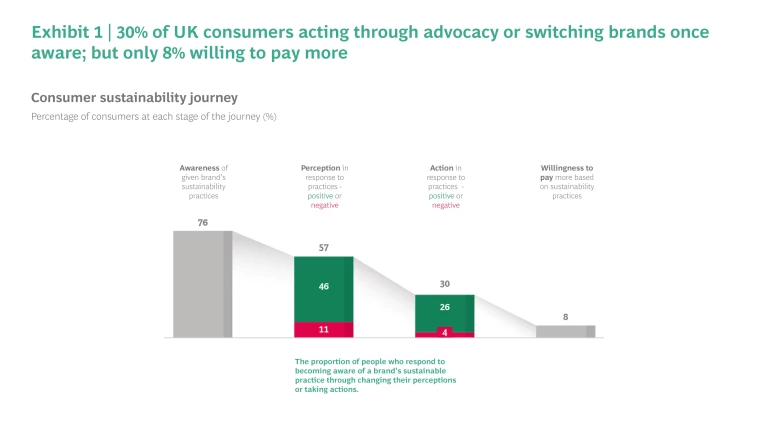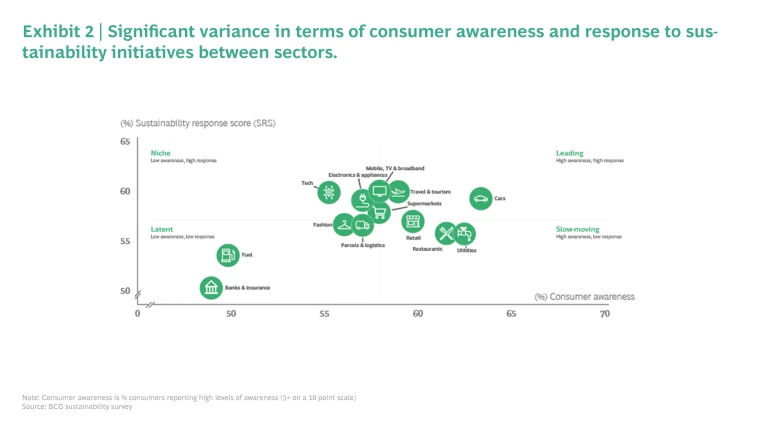As concern about the climate emergency grows, brands in all sectors are navigating the relative role of environmental and ethical initiatives and their impact on UK consumer-decision making. There is much discussion on measuring the return on sustainability investments and on the value shareholders place on companies based on their practices.
What is far less well, or too narrowly, understood is the consumer response. What do customers care about? How do they respond to brands’ sustainability efforts and what should brands do about it?
Boston Consulting Group (BCG) set out to discover the true impact of sustainability practices on UK consumer decision-making. We surveyed 10,000 UK consumers on their attitudes, actions, and views of over 100 brands across 13 sectors.
Our research revealed that sustainability is already a driver of consumer action. Sustainability practices are starting to drive purchase decisions in the short term, and—importantly—also influence brand perception and advocacy which will undoubtedly affect performance over the longer term. Making the most of both effects will be crucial in order to measure full returns on sustainability and to help mitigate the risk of underinvestment by consumer-facing businesses.
The work also demonstrates that consumers don’t hold all brands to account equally. Consumers are far more responsive to first movers and to those brands which create powerful sustainability stories, which in turn fuel word of mouth advocacy. This indicates a risk associated with inaction on sustainability, in terms of negative consumer action and the opportunity lost to more proactive competitors, even if the measurable impact on sales is not immediate.
For some brands, creating sustainability advantage will clearly have a short-term impact. But for all brands, as consumer sentiment develops and the climate crisis deepens, sustainability will become a key driver of brand selection. Bold leaders should take bold decisions now—for both the health of the planet and for the long-term health of their brands.
Consumers Care but Are Not Willing to Pay
Sustainability is already a mainstream consumer issue and consumers are taking a stance. 76% of consumers are trying to play their part and they expect brands to do the same. 57% of consumers say their perception of a brand is influenced by its sustainability practices. 30% of consumers are compelled to action, either switching brands or advocating (positively or negatively) as a result. But only 8% of consumers are willing to pay more for sustainable products and services, with many consumers believing that companies and governments should instead be funding the changes. As inflation and cost of living pressures grow, this is very likely to become more pronounced.
Willingness to pay is too narrow a measure of consumer engagement. However ‘willingness to pay’ or ‘short-term sales impact’ belies the full extent of consumer ‘return’ on sustainability investments because it ignores consumer reactions over the medium-term. These comprise the 13% who will switch when a competitor offers an affordable sustainable alternative or the 25% who become vocal promoters and drive purchasing shifts.
Consumers want to know more. Up to 70% consumers are interested in what brands are doing on sustainability, but on average less than half feel well informed.
Consumers talk and brand advocacy is key. Friends and family are the most trusted source of information and the biggest driver of brands’ sustainability perception. Digital channels come second (with social media the point of reference for the under 45s and websites for older consumers).
Gen Z will be the judge and jury. 16-24 year-olds are most aware of brands’ sustainability practices, are most likely to form an opinion and are the most critical advocates. They are by far the most likely to form a negative perception and are five times more likely to act upon it negatively as those aged 55 and over.
Customers don’t hold all brands equally to account. BCG’s Sustainability Responsiveness Score (SRS) captures the propensity of consumers to take positive or negative action once they learn about a brand’s sustainability practices.
Our research shows significant variance within as well as across sectors which means that a brands’ competitors may be getting a far higher return for the same investments. For example, in retail, utilities, travel and tourism as well as fashion, we see a 15-20 ppt difference in levels of consumer response between brands.
Unsurprisingly, sustainability challenger brands have SRS scores 15-20 ppts higher than their traditional counterparts. However, some established energy, grocer and automotive brands have started to pull ahead of their peers with differences of around 10 ppts.
It is clear that brands can influence the degree of consumer response they drive, and so create superior customer returns on sustainability investments.
Seven ‘Green Rules’ to Create Short and Long-Term Sustainability Advantage
Brands must act urgently on sustainability as part of their social responsibility agenda. This work shows that the imperative is also a commercial one, and that the extent and speed with which brands invest will have a significant impact on their ability to turn sustainability into an advantage.
We suggest seven rules that all brands can apply to increase consumer awareness of their sustainability practices and positively influence customer behaviour.
- Invest for the future, creating a platform for consumer advantage through sustainability. Move quickly and decisively, but —generally—don’t plan for or measure success in short-term sales impact. Consider a brand’s sustainability performance as the third strategic imperative alongside driving the top-line and managing costs.
- Rethink and refocus on measurement. Assess the impact of your sustainability practices across the full spectrum of consumer behaviour. Include proxies for perception and advocacy through consumer quant panels and social listening.
- Reengineer costs and invest back in a sustainable customer offering. Winners will find a way to offer an affordable and sustainable alternative, with the majority of consumers remaining reluctant to pay a green premium in the near term.
- Understand customer responsiveness then develop a bespoke plan to increase it. Benchmark sustainability responsiveness with peers to uncover specific areas of opportunity to increase ROI for your brand—eg. through changing topic focus, (re)designing specific initiatives and commitments, investing in communications channels or creating stories and engaging on platforms to promote advocacy.
- Focus on driving big impact on a few sustainability priorities that resonate most with consumers. Changes that help people reduce their own environmental impact eg. reducing a products packaging, are as important to consumers as broader corporate goals.
- Create stories that can easily be retold. Word of mouth is incredibly important, and campaigns need to be shaped in a way that they are worth talking about.
- Focus sustainability communication on those most likely to act. That means targeting core consumers and potential digital advocates. For most brands, the latter will mean speaking to younger generations, even if they are not core customers today.
Acting on sustainability is an imperative for all companies. It cannot wait until shorter term cost pressures abate or wider macro economic conditions are more favourable. Brands that move faster will drive better returns.
By investing in change, communicating these efforts effectively, and appropriately measuring impact we believe sustainability can be a significant source of long-term competitive advantage.
Now is the time to act and put consumers at the heart of the sustainability agenda. Learn more about how your brand can create sustainability advantage.
About the Sustainability Responsiveness Score (SRS)
Actions are given greater weight than perception-forming to emphasise those brands and initiatives which have the most significant impact on consumers in short and medium term.
BCG research
distribution in age, gender, region and income were interviewed to share their views on more than 100 brands and corporations, across 13 industries.






